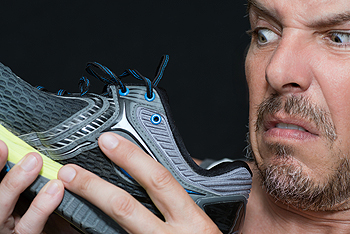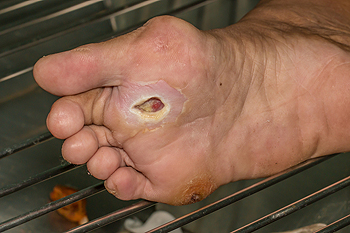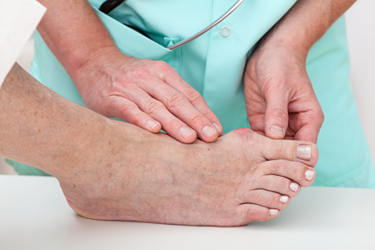
Dr. Kenneth Rosenthal
Dr. Jonathan C. O’Quinn
Dr. Michael J. Price

Dr. Kenneth Rosenthal
Dr. Jonathan C. O’Quinn
Dr. Michael J. Price
 Patients who have feet that sweat excessively may have a condition that is known as plantar hyperhidrosis. It may occur from having overactive sweat glands, and can cause discomfort and embarrassment. There are several reasons why plantar hyperhidrosis may develop. These can consist of having an overactive thyroid, taking certain medications, or having anxiety attacks. It may be controlled by using a strong antiperspirant, having specific medicines prescribed, or undergoing a surgical procedure. If you are suffering from this condition, please consult with a podiatrist as quickly as possible who can properly treat this condition.
Patients who have feet that sweat excessively may have a condition that is known as plantar hyperhidrosis. It may occur from having overactive sweat glands, and can cause discomfort and embarrassment. There are several reasons why plantar hyperhidrosis may develop. These can consist of having an overactive thyroid, taking certain medications, or having anxiety attacks. It may be controlled by using a strong antiperspirant, having specific medicines prescribed, or undergoing a surgical procedure. If you are suffering from this condition, please consult with a podiatrist as quickly as possible who can properly treat this condition.
If you are suffering from hyperhidrosis contact one of our podiatrists of Eastern Carolina Foot & Ankle Specialists. Our doctors can provide the care you need to attend to all of your foot and ankle needs.
Hyperhidrosis of the Feet
Hyperhidrosis is a rare disorder that can cause people to have excessive sweating of their feet. This can usually occur all on its own without rigorous activity involved. People who suffer from hyperhidrosis may also experience sweaty palms.
Although it is said that sweating is a healthy process meant to cool down the body temperature and to maintain a proper internal temperature, hyperhidrosis may prove to be a huge hindrance on a person’s everyday life.
Plantar hyperhidrosis is considered to be the main form of hyperhidrosis. Secondary hyperhidrosis can refer to sweating that occurs in areas other than the feet or hands and armpits. Often this may be a sign of it being related to another medical condition such as menopause, hyperthyroidism and even Parkinson’s disease.
In order to alleviate this condition, it is important to see your doctor so that they may prescribe the necessary medications so that you can begin to live a normal life again. If this is left untreated, it is said that it will persist throughout an individual’s life.
A last resort approach would be surgery, but it is best to speak with your doctor to find out what may be the best treatment for you.
If you have any questions please feel free to contact our office located in Greenville, NC . We offer the newest diagnostic and treatment technologies for all your foot and ankle needs.
 Many diabetic patients are aware of the importance of properly taking care of wounds on their feet. Foot ulcers can be common in these types of patients, and can become worse as a result of damaged nerve endings that may accompany diabetes. This may cause the patient to lose feeling in the feet, making it possible that wounds on the feet are left undetected. If an existing wound becomes infected, it may develop into a foot ulcer. One of the first steps in treating a foot ulcer is to remove the affected wound tissue. This can be beneficial in helping the wound to drain, in addition to effectively examining the tissue that lies beneath it. Patients who have foot ulcers may be guided to wear a specific type of boot, or offloading device. This is a necessary step for successful healing. There are measures that can be taken which may help to prevent wounds on the feet. These can include examining the feet daily, washing and drying the feet thoroughly, and making sure blood glucose levels are within a normal range. If you have wounds on your feet, it is strongly suggested that you are under the care of a podiatrist who can help you to properly manage this condition
Many diabetic patients are aware of the importance of properly taking care of wounds on their feet. Foot ulcers can be common in these types of patients, and can become worse as a result of damaged nerve endings that may accompany diabetes. This may cause the patient to lose feeling in the feet, making it possible that wounds on the feet are left undetected. If an existing wound becomes infected, it may develop into a foot ulcer. One of the first steps in treating a foot ulcer is to remove the affected wound tissue. This can be beneficial in helping the wound to drain, in addition to effectively examining the tissue that lies beneath it. Patients who have foot ulcers may be guided to wear a specific type of boot, or offloading device. This is a necessary step for successful healing. There are measures that can be taken which may help to prevent wounds on the feet. These can include examining the feet daily, washing and drying the feet thoroughly, and making sure blood glucose levels are within a normal range. If you have wounds on your feet, it is strongly suggested that you are under the care of a podiatrist who can help you to properly manage this condition
Wound care is an important part in dealing with diabetes. If you have diabetes and a foot wound or would like more information about wound care for diabetics, consult with one of our podiatrists from Eastern Carolina Foot & Ankle Specialists. Our doctors will assess your condition and provide you with quality foot and ankle treatment.
What Is Wound Care?
Wound care is the practice of taking proper care of a wound. This can range from the smallest to the largest of wounds. While everyone can benefit from proper wound care, it is much more important for diabetics. Diabetics often suffer from poor blood circulation which causes wounds to heal much slower than they would in a non-diabetic.
What Is the Importance of Wound Care?
While it may not seem apparent with small ulcers on the foot, for diabetics, any size ulcer can become infected. Diabetics often also suffer from neuropathy, or nerve loss. This means they might not even feel when they have an ulcer on their foot. If the wound becomes severely infected, amputation may be necessary. Therefore, it is of the upmost importance to properly care for any and all foot wounds.
How to Care for Wounds
The best way to care for foot wounds is to prevent them. For diabetics, this means daily inspections of the feet for any signs of abnormalities or ulcers. It is also recommended to see a podiatrist several times a year for a foot inspection. If you do have an ulcer, run the wound under water to clear dirt from the wound; then apply antibiotic ointment to the wound and cover with a bandage. Bandages should be changed daily and keeping pressure off the wound is smart. It is advised to see a podiatrist, who can keep an eye on it.
If you have any questions, please feel free to contact our office located in Greenville, NC . We offer the newest diagnostic and treatment technologies for all your foot care needs.
 Gout is a foot condition that can be brought upon by the buildup of uric acid due to high levels of purines. Uric acid can increase due to hereditary conditions as well as complications with the kidneys. Certain foods to avoid that are high in purine levels include red meats, red wine, oily fish, and certain vegetables. Obesity and high blood pressure are also linked to the formation of gout. Those with gout often experience severe joint pain, swelling, redness, and sensitivity in the joints of the foot. For more information about gout and a proper diagnosis, we recommend you meet with a podiatrist to discuss your treatment options.
Gout is a foot condition that can be brought upon by the buildup of uric acid due to high levels of purines. Uric acid can increase due to hereditary conditions as well as complications with the kidneys. Certain foods to avoid that are high in purine levels include red meats, red wine, oily fish, and certain vegetables. Obesity and high blood pressure are also linked to the formation of gout. Those with gout often experience severe joint pain, swelling, redness, and sensitivity in the joints of the foot. For more information about gout and a proper diagnosis, we recommend you meet with a podiatrist to discuss your treatment options.
Gout is a painful condition that can be treated. If you are seeking treatment, contact one of our podiatrists from Eastern Carolina Foot & Ankle Specialists. Our doctors will treat your foot and ankle needs.
What Is Gout?
Gout is a form of arthritis that is characterized by sudden, severe attacks of pain, redness, and tenderness in the joints. The condition usually affects the joint at the base of the big toe. A gout attack can occur at any random time, such as the middle of the night while you are asleep.
Symptoms
Risk Factors
Prior to visiting your podiatrist to receive treatment for gout, there are a few things you should do beforehand. If you have gout you should write down your symptoms--including when they started and how often you experience them, important medical information you may have, and any questions you may have. Writing down these three things will help your podiatrist in assessing your specific situation so that he or she may provide the best route of treatment for you.
If you have any questions, please feel free to contact our office located in Greenville, NC . We offer the newest diagnostic and treatment technologies for all your foot care needs.
A common infection of the toenail is referred to as toenail fungus. It typically develops in the nail bed, and it generally grows slowly. One of the first symptoms of having this ailment is noticing a yellow or white dot that appears under the tip of the nail. In severe infections, the nail may turn a dark color, and may often become brittle and can crumble. This type of fungus lives and thrives in warm and moist environments which can include swimming pools, locker rooms, and shower room floors. There are measures that can be taken which may help to prevent toenail fungus. These can consist of wearing appropriate shoes while in these types of areas, trimming the nails frequently, and keeping the feet clean and dry. There are several treatment options available, and it is suggested that you consult with a podiatrist who can offer the best solution for you.
For more information about treatment, contact one of our podiatrists of Eastern Carolina Foot & Ankle Specialists. Our doctors can provide the care you need to keep you pain-free and on your feet.
Toenail Fungus Treatment
Toenail fungus is a condition that affects many people and can be especially hard to get rid of. Fortunately, there are several methods to go about treating and avoiding it.
Antifungals & Deterrence
Oral antifungal medicine has been shown to be effective in many cases. It is important to consult with a podiatrist to determine the proper regiment for you, or potentially explore other options.
Applying foot powder on the feet and shoes helps keep the feet free of moisture and sweat.
Sandals or open toed shoes – Wearing these will allow air movement and help keep feet dry. They also expose your feet to light, which fungus cannot tolerate. Socks with moisture wicking material also help as well.
If you have any questions please feel free to contact our office located in Greenville, NC . We offer the newest diagnostic tools and technology to treat your foot and ankle needs.